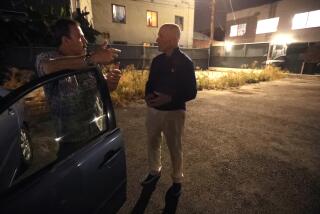‘Panhandlers Are Still Human Beings’
- Share via
Although some have dismissed it as political showboating and questioned its constitutionality, a proposed new ordinance would prohibit aggressive panhandling. Behavior such as soliciting while intoxicated, threatening, following, blocking the path of or touching a person being solicited would be punishable by fines of up to $500 and six months in jail for repeat offensers. The ordinance will be discussed at a special meeting of the Los Angeles City Council’s Public Safety Committee Feb. 24. JIM BLAIR spoke with businesspeople and social activists and panhandlers about the need for such an ordinance.
*
ROBERT CLINTON
Vice president of Clifton’s Cafeterias, Los Angeles
Clifton’s Cafeterias was started by my grandfather in 1930. His parents were missionaries in China and he saw a lot of hunger and starvation there when he was a boy. When he started his own cafeteria chain here in downtown Los Angeles, he did what he could to feed people who didn’t have any money.
He established a kind of an unwritten policy to help people who don’t have the means to buy their food. We still carry that on today. But it’s not like it used to be because of the problems in society with homelessness and addictions.
We have two cafeterias in the historic downtown core and we deal with panhandlers everyday. Panhandling today really isn’t about food. It’s about continuing a lifestyle of living on the street. The missions are running a lot of programs where meals are provided, even housing.
Basically, [panhandlers] affect our business by frightening our customers, many of whom are seniors. They are frightened by street people who behave aggressively. On occasion, panhandlers also create disturbances inside our dining rooms when they come in and solicit from our customers. That’s uncomfortable for people.
Panhandling also creates a perception that the area around our business is not safe. When people feel uncomfortable, they associate that with safety, hence our area’s not safe. In the past, we’ve hired security officers to be at our front doors to make sure that our customers enjoy a safe environment to eat in. That’s an expense we’d rather not have.
*
LENNAL SHEBAZZ
Panhandler
I’ve lived here since 1979. I’m suffering from what I call Temporary Economic Disability Syndrome. I never learned how to steal, so, if you don’t know how to steal, you ask and then God will make that person you ask an angel to help you out.
The only time I ask people for money is when I’m hungry or trying to raise enough for a cheap hotel to get a shower and a shave.
I don’t want anybody to help if they don’t want to. Some people apologize, saying, “Well, all I have is this much change right now.” I say whatever comes from your heart is the same as a million dollars to me. To make it a business would cause me to go cold and hard.
*
DENISE PREIMESBERGER
Owner, Denise’s Hallmark Shop, Larchmont
Panhandlers are a little bit more frightening for our elderly customers. I think for some people, it’s more of an inconvenience. On one hand they feel socially responsible and sad that someone is down on their luck; but on the other hand it’s an imposition and they just don’t want to be bothered. That impacts business. If someone is standing on the sidewalk actively trying to solicit, I’ve seen people cross the street because they don’t even want to be approached.
It’s not that bad a problem here in Larchmont as in some areas, because, although it sounds funny to say this, we do have regulars. So I think people are accustomed to seeing them.
There was a big community response a couple of years ago when panhandling was probably at its height and the store owners, real estate offices and the banks got together. We had placards made that said “Don’t give a handout. Give a hand. Give a contribution to Hope Net.” People also gave panhandlers a business card with the name and hours of Hope Net. Businesses encouraged their customers to pick up these cards and when someone put their hand out, they gave them the card.
I think they need more stringent enforcement particularly in regard to panhandling in traffic. It’s very dangerous, very frightening, to have people standing in the middle of the street and you have to swerve to avoid hitting them. That has to be stopped. But even with tougher enforcement of panhandling regulations, it’s important to remember that panhandlers are still human beings and circumstances sometimes put people in dire straits.
*
THERESA SIMPSON
Works on the Welfare Reform Advocacy Project, Los Angeles
I was homeless about five to six years ago for approximately a year and a half. My husband had been in a hit-and-run accident and was in a convalescent home. We went from a two-income family to a one-income family and it wasn’t enough. Things went from bad to worse.
I never personally panhandled, but my experiences have changed my outlook tremendously. Once you hit bottom, it’s very difficult to get back up. When people ask for money now, if I have 50-cents, they get a quarter. I firmly believe that the blessings have to pass through you.
We’re really a cold society. Most of the services are overcrowded or they make you jump through so many hoops.
Sometimes, they have a need for a cup of coffee or some change to take a bus across town and when they see a person with a smile they take the chance. They put their hand out. I don’t think there’s anything terrible with that.
I’m not faulting people who are afraid of panhandlers but what is the fear based on? Is it because they are dirty? Is that the prejudice? I don’t think jailing a person for asking for money is right.
Do you know how much it costs to house a person in jail, just for asking somebody for some change? Isn’t that a waste?
Take some of that money and open up some more programs. Help these people getback their self-respect. Help them with job training or whatever. These are human beings. If people would just have a clue, have a heart.
More to Read
Sign up for Essential California
The most important California stories and recommendations in your inbox every morning.
You may occasionally receive promotional content from the Los Angeles Times.













